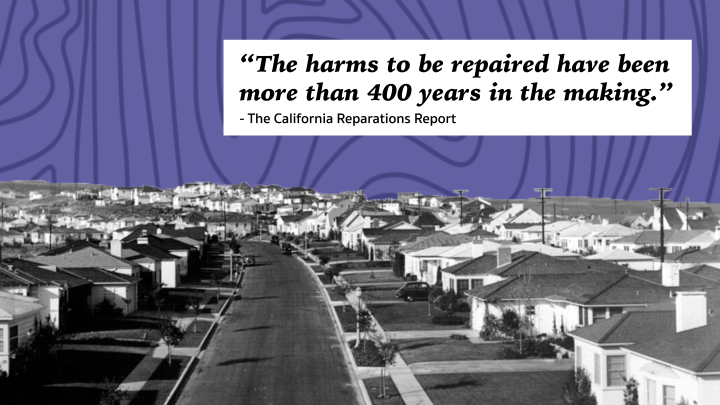
If reparations aren’t politically viable, what’s the next best thing?
If reparations aren’t politically viable, what’s the next best thing?

A bill in the California Legislature would create a first-of-its-kind agency to administer economic reparations for slavery, if lawmakers were to approve reparations. State Sen. Steven Bradford introduced the bill to create the agency last summer, with a vote possible in the legislature this year. But reparations efforts have had a hard time winning approval in state and local governments.
Only a handful of local efforts have managed to become law. And only 3 in 10 adults say descendants of people enslaved in the U.S. should get repaid one way or another, according to a 2021 Pew study. And so in addition to reparations proposals, there are other forms of redress gaining momentum.
While California lawmakers are gearing up to debate reparations following recommendations from a task force, author Richard Rothstein has been touring the country to promote a different solution. He’s co-authored a new book called “Just Action” with his daughter Leah Rothstein.
“We have an apartheid society today,” Richard Rothstein said. “The reforms to undo it are not only federal, but they’re also very heavily local, because local policies reinforce and sustain the segregation that the federal government created.”
Though Rothstein does not believe a reparations bill can pass, he agrees with task force recommendations such as down payment assistance on housing, health care and free tuition to state colleges.
“I agree with that completely. I agree with that completely. But that’s not reparations,” he said. “There are specific programs targeted at small areas, individual areas, where remedy is required. You know, reparations is a sum of money.”
Experts such as Rothstein and Carolina Reid, a University of California, Berkeley, professor who specializes in affordable housing and urban policy, have documented how institutional inequalities have continued to widen racial wealth disparities over time.
This includes housing discrimination under the GI Bill of Rights. Despite the law’s intent to provide low-cost mortgages and other benefits to World War II veterans, the Federal Housing Administration and the Veterans Administration excluded and discriminated against Black folks. This locked many of them into less-affluent and under-resourced neighborhoods, excluding them from rapidly developing suburbs that were predominantly white. The effects of this segregation are still evident today.
“For example, we know that Black households are still much more likely to be denied a mortgage today,” Reid said. “We know that even if they get a mortgage, Black households will pay more for that credit than non-Hispanic white households.”
Rothstein is calling for changes in the credit scoring system. Timely rent payments, for example, often are not considered by credit rating agencies. This disadvantages Black homebuyers in particular. And in 2021, Fannie Mae reported that about 17% of first-time homebuyers who didn’t qualify for mortgages because of limited credit histories would have qualified if rental payments were considered.
Rothstein also noted that many local governments in communities with higher numbers of Black people don’t perform annual property reassessments, sometimes waiting up to five years or more. Assessments are more frequent in neighborhoods where white residents are the majority, which raises those property values faster. This leads to Black people paying higher property taxes relative to the market value of their homes.
“This is a purely local issue, it needs to be addressed at the local level,” Rothstein said. “And the only way to do that is with what we call in the book [‘Just Action’] a ‘reinvigorated Civil Rights Movement’ that can demand remedies to this particular disparate impact on African Americans with the property tax assessment system.”
And this renewed movement, he believes, would be more realistic than any expectation of reparations.
“There are dozens of these specific policies, specific programs that can be addressed and remedied, and if they were, we would really make progress,” he said.
UC Berkeley professor Reid has researched the disproportionate impact of predatory lending on communities of color in California and their link to higher foreclosure rates. She said any progress would require a serious commitment from federal and state governments.
“A reparations agenda is having the federal government and state governments commit real resources to making those local ideas realities,” Reid said.
In our series “Golden Promises: The Battle Over Slavery Reparations in California,” “Marketplace Morning Report” brings you more of the history, details and challenges of the state’s reparations movement. Part 1 focuses on where the legislative process stands. Part 2 focuses on who would be eligible for reparations.
There’s a lot happening in the world. Through it all, Marketplace is here for you.
You rely on Marketplace to break down the world’s events and tell you how it affects you in a fact-based, approachable way. We rely on your financial support to keep making that possible.
Your donation today powers the independent journalism that you rely on. For just $5/month, you can help sustain Marketplace so we can keep reporting on the things that matter to you.


















